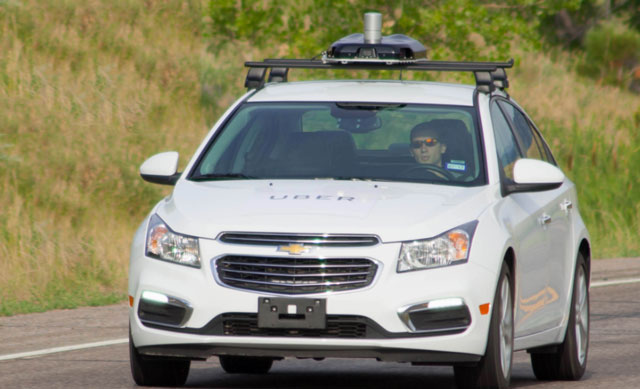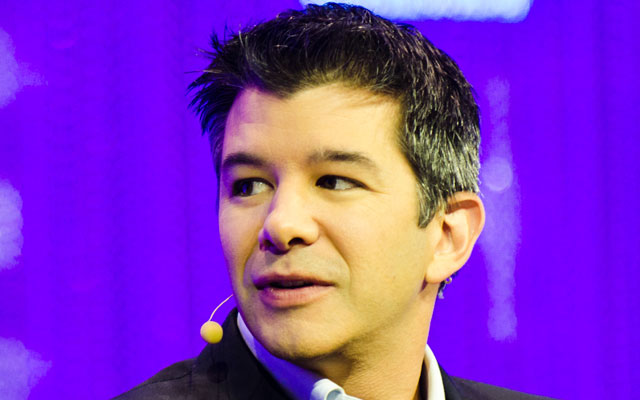 It’s been a tough few months for Uber. Already this year, it has been hit by a massive boycott followed swiftly by serious allegations of institutional sexism and sexual harassment. Now the most serious scandal in the ride-hailing company’s tumultuous history has broken: it appears that Uber has used its technology to evade and thwart law enforcement and other officials in contentious markets.
It’s been a tough few months for Uber. Already this year, it has been hit by a massive boycott followed swiftly by serious allegations of institutional sexism and sexual harassment. Now the most serious scandal in the ride-hailing company’s tumultuous history has broken: it appears that Uber has used its technology to evade and thwart law enforcement and other officials in contentious markets.
The New York Times broke the story on Friday, based on information received from four current and former Uber employees. The technology, called Greyball, was originally created to prevent disruption to Uber’s services by people using it in bad faith, such as competitors seeking to harass drivers, or thieves hoping to rob them. But at some point, Uber began to use the system to deceive law enforcement officials.
Uber has a bad habit of entering new cities without taking the time to comply with local laws and regulations. Authorities in those cities would normally respond by fining drivers and Uber for breaking these laws. But Greyball has made it difficult, if not impossible, for law enforcers to catch drivers in the act.
Greyball gives Uber’s operational teams in cities the ability to detect, track and avoid authorities. Once the phone of a would-be rider is flagged (or “greyballed”) they will be shown “phantom” cars whenever they open the app, and will be unable to find a driver willing to pick them up. This makes effective enforcement of local laws almost impossible. Uber cars are unmarked — catching them by random stops or normal surveillance is just not practical.
The root of these issues is obvious: the company’s leaders are drunk on their own success and have lost touch with reality
This technology has proved particularly useful in markets where regulators and vested interests have tried to prevent Uber from gaining a foothold. By effectively locking authorities out of their service, Uber has been able to more easily gain de facto acceptance in heavily regulated cities like Paris and Boston.
This information, assuming it is true, could not have emerged at a worse time. Uber is already reeling from damning accusations by several female employees — both former and current. They depict the company as toxic, performance-obsessed and deeply misogynistic. At least three women are already suing the company for sexual harassment or verbal abuse.
On top of this, the company faced a large scale revolt by its customers when CEO Travis Kalanick agreed to join US President Donald Trump’s economic advisory council. Sources within the company suggest that the ensuing grassroots social media campaign resulted in over 200 000 people deleting the app in less than a week. Kalanick hastily resigned from the council in response.
All of this must be deeply troubling to Uber’s investors, who have ploughed over US$13bn into the company. Because the company is still privately held, valuations are somewhat opaque, but the company is generally accepted to be worth around $70bn. Should public opinion turn against Uber, it will struggle to live up to that lofty valuation.

Uber is a victim of its own spectacular success. Tens of millions of people around the globe use its service daily, and most praise it effusively. In most cities, it is cheaper, faster and better than incumbent taxi services. This has made the company a target for everyone from competitors to regulators to left-wing activists, and has drawn increasing scrutiny from the media.
From that perspective, Greyball is a vital tool for the company. Without it a few dozen determined vandals, each armed with several mobile phones, could easily disrupt an entire city’s Uber service. Around the world, including in South Africa, Uber drivers are regularly harassed, attacked and even killed.
But in its quest to disrupt an industry, the company has nurtured a culture that rewards performance at all costs. The unintended consequences of this culture are now painfully obvious. The radically libertarian mindset of Uber’s founders has allowed the company to flourish, but may also have sown the seeds of its downfall.
These scandals are a gift to Uber’s critics and enemies. Anti-capitalist commentators are particularly smug, seeing this as more evidence of the company’s predatory and exploitative business practices.
Even if public opinion does not turn against it, the company’s current culture will steer it off a cliff
I’m deeply suspicious of Uber’s more hysterical detractors. Casting it as the cartoon villain serves the purposes of too many vested interests for it to be credible. The armchair Marxists expect us to believe that all the incumbents in the industry are ideal employers, and that Uber is systematically crushing steady, well-paid jobs in order to set up a global monopoly.
The reality is far more nuanced and complex. Too many taxi industries around the world have existed in cosy symbiosis with regulators. Supply has been intentionally limited to ensure prices remain high. Exhibit A is the licensing system for yellow cabs in New York City. Until recently these were selling for as much as $1m.
To imagine that any ordinary taxi driver could afford to enter such a market is laughable. In large cities like New York, taxi firms are typically tightly controlled by a small number of operators. These owners collude on price, if it is not already set by their tame regulators. This means that taxi trips cost significantly more than they should. Try catching a black cab in London to see this in action.

I don’t accept that Uber is inherently evil or unethical, but these scandals are a sign that radical changes are required within the company. Even if public opinion does not turn against it, the company’s current culture will steer it off a cliff.
For example, if the European Union were to turn against Uber the way it has against Google and Microsoft, the consequences would be ruinous. Europe is one of Uber’s most important markets, and nothing annoys Eurocrats like a company that behaves as though it is above the law.
The root of these issues is obvious: the company’s leaders are drunk on their own success and have lost touch with reality. This is the only explanation for their self-defeating behaviour. How else could they expect to get away with systematically protecting sexual harassers? Or cosying up to Donald “Cheeto Benito” Trump?
The ability to roll out a programme like Greyball reveals a spectacular lack of self-reflection. Any company that intentionally disrupts the enforcement of a law — even where the law is petty or unclear — is putting itself in the same category as Enron. It takes a special kind of hubris to rationalise such reckless tactics.
So now, Uber is down, and its detractors are lining up to kick it in the face. The company’s future depends on its leaders’ actions over the next few months. Either it reforms and rises to new heights, or it collapses under the weight of its own success. It’s time for Kalanick and his team to grow up and lead.
- Alistair Fairweather is the founder of PlainSpeak, a consultancy focused on helping businesses and people to get the most out of technology




